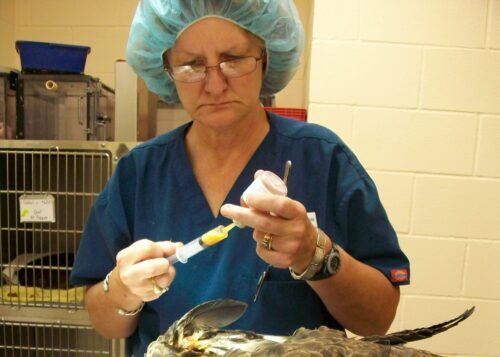This is an excerpt of the “From the Executive Director” article found in the Fall/Winter 2020 issue of “A Feather in the Wind” (the Last Chance Forever newsletter)
At Last Chance Forever, we strive to perform our work scientifically, using veterinary medicine, behavioral knowledge, and common sense. When an animal arrives, it is not given a name, but a band number. We invite the rescuer to watch the examination, because after all, natural resources belong to us all. We stabilize the bird, give fluids, clean and treat wounds if need be, then put it in an appropriate housing unit. The fluids keep the bird hydrated and provide necessary electrolytes so food is not necessary at the moment. During this period, our veterinarian Dr. Melissa Hill and I are notified. Dr. Hill assesses the initial information and may direct other medications. This may be the beginning of a hopefully quick recovery, or of weeks of care, including possible surgeries and physical therapy.
We also begin the process of trying to figure out why this happened. Sometimes the answer is clear. But the question has many times led us to unexpected conclusions. An x-ray might show traces of metal in a wing fracture caused by a bullet. Blood tests may find the bird suffering from lead poisoning. Unfortunately, we test all eagles for lead because over 90% are now carrying it in the blood.
This is very disconcerting not only for the birds but for the human population. After all, we live together in the same environment. What happens to them can be a warning to us. During our investigations, we sometimes find out that an adult bird was hunting near the road because it was desperate, and the desperation was caused by internal and external parasites that deplete the bird’s blood and strength. We have even found West Nile virus in multiple cases that gave us impetus to warn health authorities of the possible effects on human populations.
All of the above, I hope give you a reason to understand this next statement, “we are on the frontline” working with indicator species that live right near the top of the food chain. With our very fine surgeon, Dr. Melissa Hill DVM, our ever so faithful staff and volunteers, and your gracious support, we can continue to provide this service. We hope you will embrace our work and be conservation partners with us. We need your help! Together we can and are making a difference.
I hope your days are filled with joy.
John Karger
Executive Director
Master Falconer

